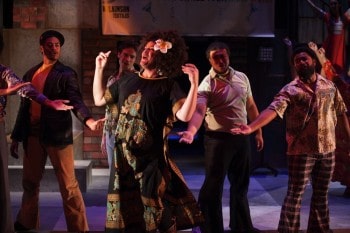The Pacific ‘Les Mis’ comes to the Adelaide Cabaret Festival
Anapela Polataivao is bringing her show The Factory, which she directed for both its 2011 and 2013 runs in New Zealand, to this year’s Adelaide Cabaret Festival. Talking with Aussie Theatre’s Max Cooper, Polataivao admits that she is incredibly excited to be “sharing our Pacific story with the rest of the world.”

Image supplied
In 2002 two graduates of the Toi Whakaari New Zealand Drama School, Anapela Polataivao and Vela Manusaute created the Pacific Theatre, Kila Kokonut Krew, wanting to “fill a void in the Pacific Island performing arts industry”. They have since been joined by Stacey Leilua, Aleni Tufuga and Glen Jackson; together they are the heart of Kila Kokonut Krew.
The Factory focuses on a girl called Losa, and her father who migrate to New Zealand in 1974. Polataivao explains that “the experience of Losa and her Father arriving in New Zealand from Samoa is a journey that thousands of Islanders made during that time”.
Polataivao describes The Factory as “a great hybrid of Pacific and contemporary [1970s] song and dance … from traditional fa’ataupati and pate drumming, to more modernised Pasifika dance”. The cast is similarly diverse; as Polataivao says “we have actors like Paul Glover who is a familiar face to New Zealand screens and stages, right through to graduates fresh out of PIPA (Pacific Institute of Performing Arts). We have Samoans, Tongans, Niueans, Tokelauans and Europeans”. For the current production old hands who have been a part of The Factory since its inception in 2011 are joined by some fresh faces. As Polataivao explains, the one quality they share is that they “are all strong singers, dancers and actors”.
When I asked her to expand on the experiences of Pacific Islanders, as represented by Losa and her father, Polataivao told me that many Islanders had left their Island paradise in search of new opportunities – education, money, the dream of milk and honey. Many knew that this was goodbye to their extended families for a very long time. As she explained, “in Samoan culture [where Losa and her family come from] it could bring huge embarrassment and shame on your family if you failed in a venture like this, and the risk of that is explored in The Factory“.
The goal of representing these experiences on a stage using the arts and theatre of the Islanders themselves, is clearly at the heart of the show. There is traditional Samoan dance, music and even instruments in the show, which further anchor the Samoan traditional culture into the piece. Polataivao assures me that the combination of these elements with the music of the 1970s, representing the blending of cultures experienced by the characters, results in an exciting theatrical piece.
I asked her more about the development of the show. As Polataivao says, “It’s been nearly a four year journey of development … Vela [Manusaute, the writer] brought the idea and concept to us in 2010 and the show has just gone from strength to strength. We are constantly improving it, making the story stronger, the music better. It’s safe to say that the 2014 version of The Factory … is the best yet.” For her and the company, being part of the Cabaret Festival is a great opportunity and Polataivao cannot help but re-emphasise how excited she to be able to share the distinctive style of Pacific dance and song with Adelaide Cabaret Festival audiences.
According to Polataivao, there is a buzz in New Zealand about the return of The Factory as a lot of people missed out on seeing it last year at the Auckland Arts Festival. She tells me that the show has been well received by NZ critics, with NZ Herald reviewer Janet McAllister describing The Factory as “the Pacific Les Mis”. Polataivao considers this to be an apt comparison as “like Les Mis, The Factory explores an era of political turmoil; there is romance, family struggles, unfairness and above all, redemption … I think calling it the ‘Pacific Les Mis’ was a very accurate description indeed.”
Given that comparison Polataivao and the Kila Kokonut Krew would like to think that The Factory might become “as well known and widely respected”.
The Factory is at the Dunstan Playhouse Thursday 12 June at 6:30 PM, Friday 13 June at 7 PM, and Saturday 14 June at 7 PM.
